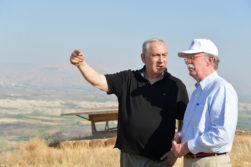Israel has long claimed that Israeli security force should remain in the Jordan Valley—which acts as a natural buffer shielding Israel from its many enemies to the East—in any peace deal with the Palestinians. This is something of a sticking point, as the territory in Judea and Samaria is also part of the land claimed by the Palestinians, which they call the West Bank. On Sunday, after touring the Jordan Valley with Israeli Prime Minister Benjamin Netanyahu, United States National Security Adviser John Bolton acknowledged the importance of the valley to Israel, and he promised US President Donald Trump would keep that in mind as the Americans prepare to announce their “Deal of the Century” peace plan.
“I’ll just say that without security there is no peace, there is no long-lasting peace. And I just think it’s too bad, Prime Minister, that more Americans can’t come to locations like this, see the geography, understand its significance, understand how it affects Israel’s critical security position, and explain why Israel has taken the view that it has,” said Bolton in comments published by Netanyahu’s office.
“I can assure you that President Trump will take the concerns that you have voiced so clearly over the years very much into account as we go forward on this.”
The strongly supportive comments come after President Trump has already acknowledged Israel’s capital of Jerusalem and moved the US embassy there, as well as having officially recognized Israeli sovereignty over the Golan Heights.
And Bolton wasn’t the only Israeli official who took the Jordan Valley message to heart. US Ambassador to Israel David Friedman, on Twitter on Sunday, noted he “toured the Jordan Valley today with @IsraeliPM and @AmbJohnBolton. Saw up front the extraordinary importance of Israel’s control of this territory to the security of Israel and the entire region.”
Bolton, on his own Twitter page in a series of tweets, compared the Jordan Valley situation to Israel’s northern border with the Golan Heights. “I saw firsthand the strategic importance that these locations have on Israel’s national security,” tweeted Bolton, following up by saying that “in similar acknowledgement of the simple but profound reality that for Israel to defend itself, it cannot relinquish strategic ground along its border, the President in March, signed a proclamation recognizing Israeli sovereignty over the Golan Heights.”
The Jordan Valley’s natural topography contributes directly towards Israel’s defense, according to Netanyahu. The Israeli leader, in the press release from his office, told the American officials that “as you can see, the Jordan Valley offers Israel the minimal strategic depth and strategic height for the defense of our country. Our presence here also guarantees stability and security for the entire region,” he said.
“For those who say that for peace to be established Israel has to leave the Jordan Valley, I’ll say that’s not going to bring peace, that’s going to bring war and terror. We’ve been there and we don’t want to be there again.”
Back in 2006, Israel withdrew from their coastal border along the Gaza Strip to give the territory to the Palestinians. Rather than turn the unconditional gesture into a springboard for peace, Gaza has been used to smuggle in and develop weapons to become a hotbed for terrorists.
Regarding the peace plan yet to be unveiled by the Trump Administration, Netanyahu expressed an open mind to the US proposal. He was quoted as saying, “In general, I would say that we’ll hear the American proposition, hear it fairly and with openness. I cannot understand how the Palestinians, before they even heard the plan rejected it outright. That’s not the way to proceed.”
However, Netanyahu made it clear they have their own view on how the Jordan Valley should be addressed. “Under any peace agreement, our position will be that Israel’s presence should continue here for Israel’s security and for the security of all.
“…We believe that peace is coupled and dependent on security. Our presence here guarantees security, and therefore guarantees peace.”
(By Joshua Spurlock, www.themideastupdate.com, June 23, 2019)

